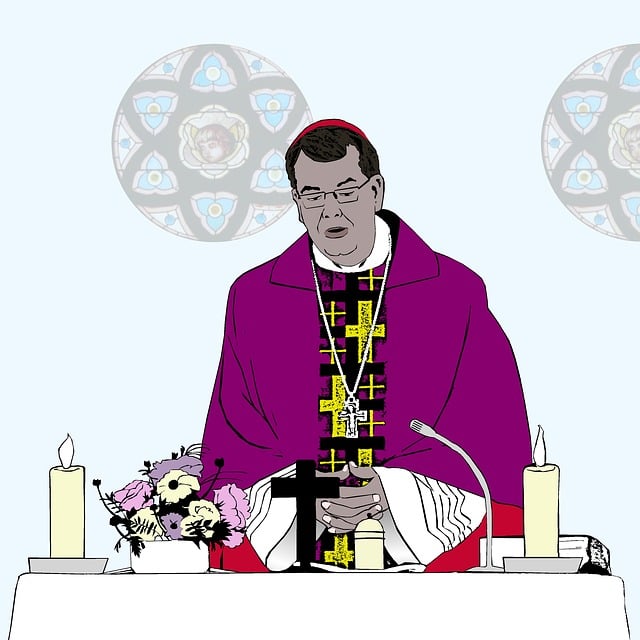A chaplain in the Catholic Church is a priest or lay person who provides spiritual guidance and support to individuals in various settings, such as hospitals, prisons, military bases, and universities. They offer pastoral care, administer sacraments, and provide comfort and counsel to those in need. Chaplains play a vital role in ministering to the spiritual needs of others and helping them grow in their faith.
Table of Contents
Role of a Chaplain in the Catholic Church
Have you ever wondered what a chaplain does in the Catholic Church? Chaplains play a vital role in providing spiritual care and support to individuals in various settings. Whether it’s in hospitals, prisons, schools, or the military, chaplains are there to offer comfort, guidance, and prayer to those in need.
In the Catholic Church, a chaplain is a priest or deacon who is appointed to a specific institution or group to minister to the spiritual needs of its members. This can include offering Mass, administering the sacraments, providing pastoral counseling, and leading prayer services. Chaplains are often called upon to offer support during times of crisis, such as illness, death, or other difficult situations.
One of the key responsibilities of a chaplain is to provide a listening ear and a compassionate heart to those they serve. They are trained to offer spiritual guidance and support to individuals of all faith backgrounds, helping them to find peace and comfort in times of distress. Chaplains are also skilled in providing pastoral care to those who may be struggling with their faith or facing moral dilemmas.
Chaplains in the Catholic Church are often called upon to minister to the sick and dying. They offer prayers, anointing of the sick, and the Eucharist to those who are hospitalized or homebound. Chaplains also work closely with healthcare providers to ensure that patients receive the spiritual care they need during their time of illness.
In addition to their work in healthcare settings, chaplains also serve in prisons, offering spiritual support to inmates and staff. They provide pastoral counseling, lead Bible studies, and offer Mass and other religious services to those who are incarcerated. Chaplains work to bring hope and healing to those who may feel forgotten or abandoned by society.
Chaplains in the Catholic Church also play a crucial role in schools and universities. They offer spiritual guidance to students, faculty, and staff, helping them to grow in their faith and deepen their relationship with God. Chaplains lead retreats, offer spiritual direction, and provide opportunities for prayer and worship on campus.
Another important role of a chaplain in the Catholic Church is serving in the military. Military chaplains provide spiritual care and support to service members and their families, offering Mass, confession, and counseling to those who are serving their country. Chaplains work to bring comfort and strength to those who may be facing the challenges of military life.
In conclusion, chaplains in the Catholic Church play a vital role in providing spiritual care and support to individuals in a variety of settings. Whether it’s in hospitals, prisons, schools, or the military, chaplains are there to offer comfort, guidance, and prayer to those in need. They work tirelessly to bring hope and healing to those who are facing difficult circumstances, offering a listening ear and a compassionate heart to all who seek their help. Chaplains truly embody the love and mercy of Christ as they minister to those in need.
Qualifications and Training for Catholic Chaplains
When it comes to serving the spiritual needs of individuals in various settings, chaplains play a crucial role. In the Catholic Church, chaplains are ordained ministers who provide pastoral care to people in hospitals, prisons, military bases, and other institutions. They offer support, guidance, and comfort to those in need, regardless of their religious beliefs.
To become a Catholic chaplain, individuals must meet certain qualifications and undergo specific training. One of the primary requirements is being a practicing Catholic in good standing with the Church. This means attending Mass regularly, participating in the sacraments, and living a life in accordance with Catholic teachings. Chaplains are expected to be role models of faith and integrity, so a strong commitment to their own spiritual growth is essential.
In addition to being devout Catholics, chaplains must also possess a deep sense of compassion and empathy. They must be able to listen attentively, offer words of comfort, and provide spiritual guidance to those who are struggling. Chaplains often work with individuals who are facing difficult circumstances, such as illness, grief, or incarceration, so having a caring and nonjudgmental attitude is crucial.
To prepare for the role of a chaplain, individuals typically undergo specialized training and education. Many chaplains have a background in theology, pastoral ministry, or counseling. Some may have a degree from a seminary or theological school, while others may have completed a certification program in pastoral care. Regardless of their educational background, chaplains must be well-versed in Catholic teachings and traditions, as well as have a solid understanding of pastoral care principles.
In addition to formal education, chaplains often participate in internships or supervised ministry experiences. These opportunities allow them to gain practical experience working with individuals in need and develop their pastoral skills. Chaplains may also receive ongoing training and professional development to stay current on best practices in pastoral care and counseling.
One of the unique aspects of being a Catholic chaplain is the opportunity to minister to individuals of all faiths. While chaplains are rooted in the Catholic tradition, they are called to serve people of diverse religious backgrounds and beliefs. This requires chaplains to be respectful and open-minded, honoring the spiritual practices and traditions of those they serve.
Overall, the role of a Catholic chaplain is a challenging yet rewarding one. It requires a strong commitment to one’s faith, a compassionate heart, and a willingness to serve others in their time of need. By meeting the qualifications and undergoing the necessary training, individuals can prepare themselves to be effective and caring chaplains in a variety of settings. Whether in a hospital, prison, or military base, Catholic chaplains play a vital role in providing spiritual care and support to those who need it most.
Importance of Chaplains in Providing Spiritual Care

Chaplains play a crucial role in providing spiritual care within the Catholic Church. They are trained individuals who offer support, guidance, and comfort to those in need. Whether it be patients in hospitals, inmates in prisons, or students in schools, chaplains are there to provide a listening ear and a compassionate heart.
One of the key aspects of a chaplain’s role is to offer spiritual guidance to those who may be struggling with their faith or facing difficult circumstances. They are there to provide a sense of hope and reassurance, helping individuals to find peace and strength in their beliefs. Chaplains often work closely with other healthcare professionals, such as doctors and nurses, to ensure that patients receive holistic care that addresses their spiritual needs as well as their physical and emotional well-being.
In addition to offering spiritual support, chaplains also play a vital role in providing pastoral care to those who are going through challenging times. They offer a non-judgmental presence and a safe space for individuals to express their fears, doubts, and concerns. Chaplains are trained to offer comfort and solace in times of grief and loss, helping individuals to navigate their emotions and find a sense of peace amidst the turmoil.
Chaplains also play a crucial role in promoting social justice and advocating for the marginalized and vulnerable members of society. They work tirelessly to address issues of poverty, inequality, and discrimination, striving to create a more just and compassionate world. Chaplains often collaborate with community organizations and social service agencies to provide support and resources to those in need, working towards a more inclusive and equitable society.
One of the most important aspects of a chaplain’s role is to foster a sense of community and belonging within the Catholic Church. They work to create a welcoming and inclusive environment where all individuals feel valued and accepted. Chaplains often organize events and activities that bring people together, fostering a sense of unity and solidarity among the faithful.
Chaplains also play a crucial role in providing pastoral care to families and loved ones who are going through difficult times. They offer support and guidance to those who are grieving the loss of a loved one, helping them to find comfort and healing in their faith. Chaplains also work with couples who are facing challenges in their relationships, offering counseling and support to help them navigate their difficulties and strengthen their bond.
In conclusion, chaplains play a vital role in providing spiritual care within the Catholic Church. They offer support, guidance, and comfort to those in need, helping individuals to find peace and strength in their beliefs. Chaplains work tirelessly to promote social justice, advocate for the marginalized, and foster a sense of community and belonging within the Church. Their dedication and compassion make them invaluable members of the Catholic community, offering hope and healing to all who seek their guidance.
Differences Between Chaplains and Priests in the Catholic Church
Have you ever wondered what exactly a chaplain is in the Catholic Church? While many people are familiar with the role of priests in the Church, chaplains are a lesser-known but equally important part of the clergy. In this article, we will explore the differences between chaplains and priests in the Catholic Church.
First and foremost, it is important to understand that both chaplains and priests are ordained ministers in the Catholic Church. However, their roles and responsibilities differ significantly. Priests are typically assigned to a parish where they serve as the spiritual leader of the community. They celebrate Mass, administer the sacraments, and provide pastoral care to the parishioners.
On the other hand, chaplains are appointed to specific institutions or organizations to provide spiritual support to the people within those communities. This could include hospitals, prisons, universities, or the military. Chaplains are trained to offer emotional and spiritual guidance to individuals in times of crisis or need. They often work with people of all faiths, not just Catholics, and are trained to be sensitive to the diverse religious beliefs of those they serve.
One of the key differences between chaplains and priests is their focus on pastoral care. While priests are primarily responsible for the sacramental life of the Church, chaplains are more focused on providing support and comfort to those in need. This could involve visiting patients in the hospital, offering counseling to inmates in prison, or providing guidance to students on a college campus.
Another important distinction between chaplains and priests is their training and education. Priests undergo years of seminary training to prepare for their role as spiritual leaders in the Church. They study theology, scripture, and pastoral care to equip them for their ministry. Chaplains, on the other hand, often have specialized training in areas such as counseling, psychology, or social work. This additional training helps them to better understand the needs of the people they serve and provide appropriate support.
Despite these differences, both chaplains and priests share a common goal: to bring the love and mercy of God to those in need. They both serve as instruments of God’s grace in the world, offering hope and healing to those who are suffering. Whether they are celebrating Mass in a parish or offering prayers in a hospital room, chaplains and priests are united in their mission to bring God’s presence to those they encounter.
In conclusion, chaplains play a vital role in the Catholic Church, offering spiritual support to individuals in a variety of settings. While they may not have the same responsibilities as priests, chaplains are essential members of the clergy who provide comfort and guidance to those in need. Whether they are ministering to the sick, the imprisoned, or the grieving, chaplains embody the compassion and mercy of Christ in their work. So the next time you encounter a chaplain, remember the important role they play in bringing God’s love to those who need it most.
Challenges Faced by Chaplains in the Catholic Church
Being a chaplain in the Catholic Church is a calling that requires a deep sense of faith, compassion, and dedication. Chaplains play a crucial role in providing spiritual care and support to individuals in hospitals, prisons, military bases, and other settings. However, being a chaplain in the Catholic Church also comes with its own set of challenges.
One of the main challenges faced by chaplains in the Catholic Church is the emotional toll of their work. Chaplains often find themselves in situations where they are called upon to provide comfort and support to individuals who are facing difficult circumstances, such as illness, grief, or loss. This can be emotionally draining, and chaplains must find ways to cope with the stress and maintain their own emotional well-being.
Another challenge faced by chaplains in the Catholic Church is the need to balance their spiritual duties with the demands of their everyday lives. Chaplains are often called upon to be available at all hours of the day and night, and they must find ways to juggle their responsibilities as chaplains with their personal and family commitments. This can be a difficult task, and chaplains must be able to set boundaries and prioritize their own well-being in order to avoid burnout.
In addition to the emotional and logistical challenges of being a chaplain in the Catholic Church, chaplains also face the challenge of navigating the complex dynamics of the institutions in which they work. Chaplains must work closely with hospital staff, prison officials, military personnel, and other professionals in order to provide spiritual care to those in need. This can sometimes be a delicate balancing act, as chaplains must navigate the different cultures, hierarchies, and expectations of the institutions in which they serve.
Despite these challenges, chaplains in the Catholic Church are driven by a deep sense of faith and a desire to serve others. They find strength in their relationship with God and in the knowledge that they are making a positive impact on the lives of those they serve. Chaplains often draw on their own spiritual practices, such as prayer, meditation, and reflection, to help them cope with the challenges they face in their work.
Ultimately, being a chaplain in the Catholic Church is a rewarding and fulfilling vocation. Chaplains have the opportunity to provide comfort, hope, and healing to those who are in need, and to be a source of light and love in the midst of darkness. While the challenges of being a chaplain are real, so too are the rewards, and chaplains in the Catholic Church continue to answer the call to serve with faith, compassion, and dedication.
Conclusion
A chaplain in the Catholic Church is a priest or lay person who provides spiritual guidance and support to individuals in various settings, such as hospitals, prisons, or the military. They offer pastoral care, sacraments, and prayer to those in need, regardless of their religious affiliation. Chaplains play a crucial role in ministering to the spiritual needs of others and offering comfort and solace in times of crisis.


